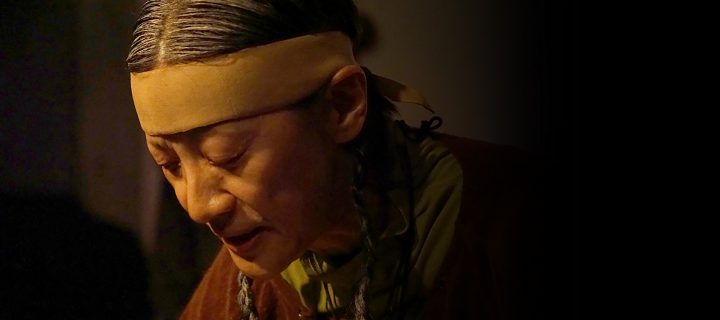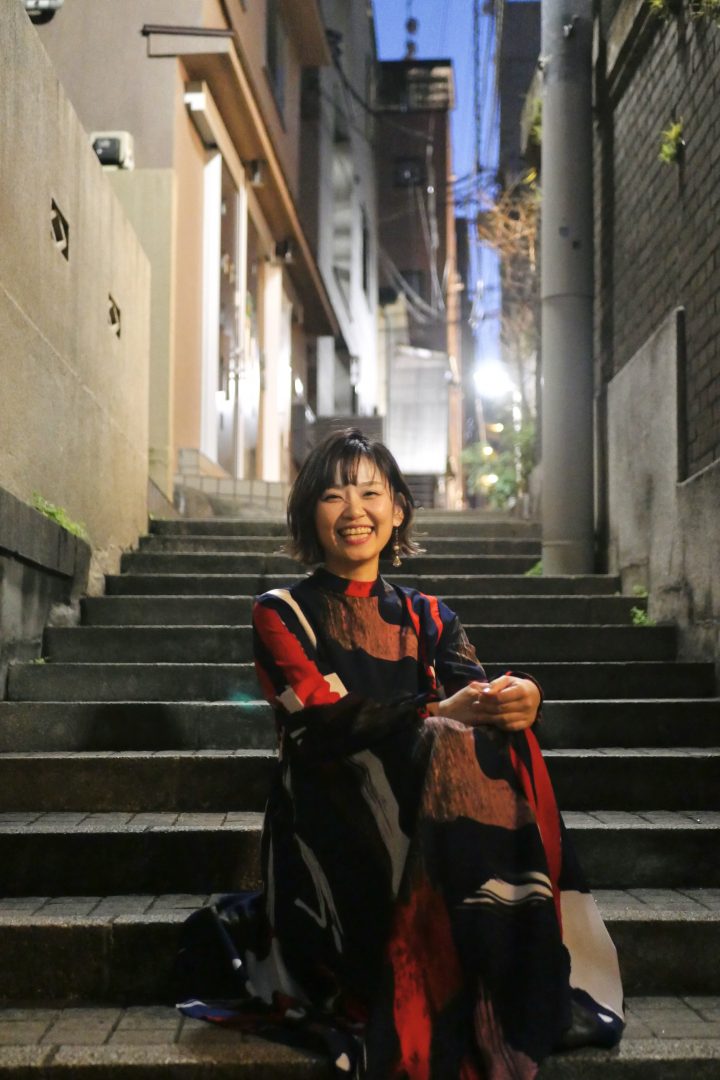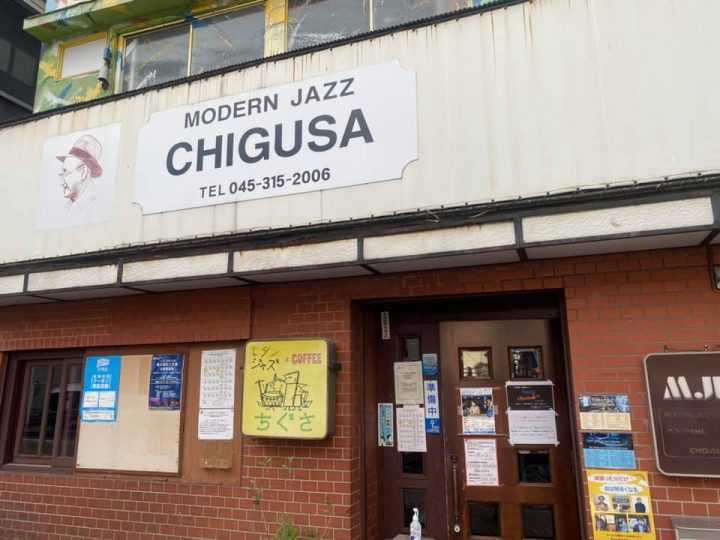It's a shame you don't know about it!
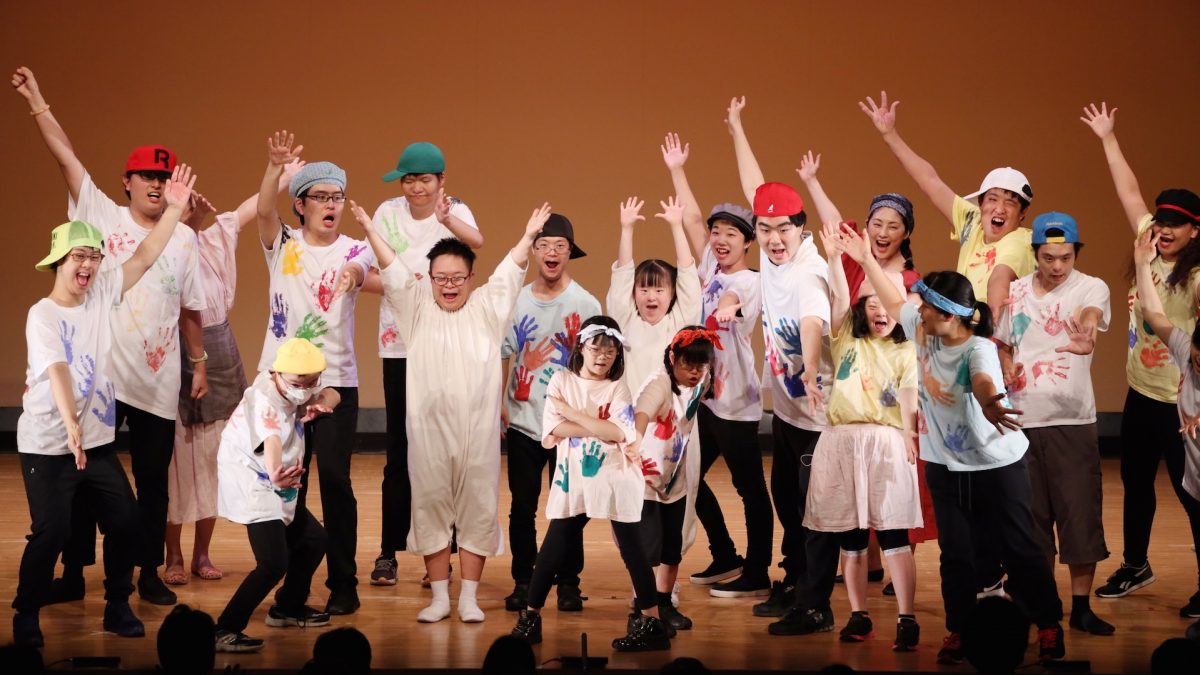
The world of performing arts for people with intellectual disabilities
Tomoko Utsumi (President of NPO Dream Energy Project)
■ Don't let COVID-19 get the better of you! Online concert
The "Wonderful Encounter Concert" was scheduled to be held on March 21, 2020, World Down Syndrome Day.
The plan was to hold a collaborative concert featuring piano, vocal, and harp performances by people with Down syndrome, as well as plays and songs by people with intellectual disabilities, but this was postponed to May due to the spread of COVID-19. When this became impossible, there was talk of postponing the event "after autumn," but it was decided to hold it as an online concert instead.
For someone like me who is not good with IT, this was a very bold challenge.
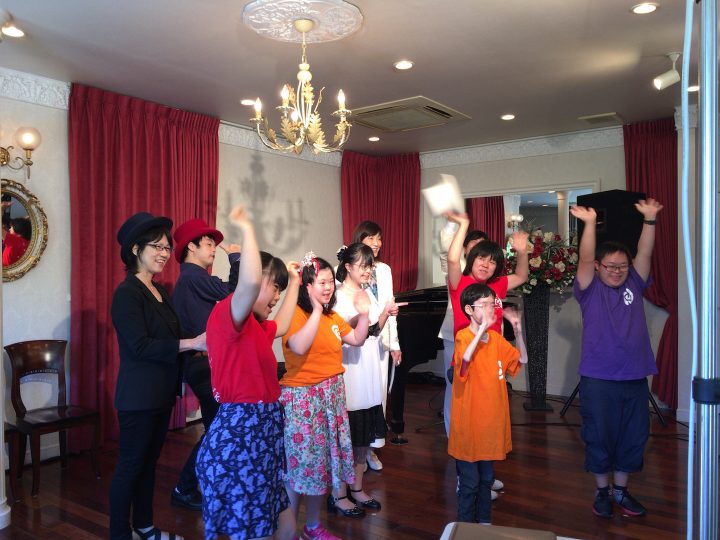
I represent the NPO Dream Energy Project (commonly known as DreamPro), which creates learning and experience opportunities for people with intellectual disabilities and supports work experience. As one of the pillars of our activities, we have also held plays and concerts for people with intellectual disabilities, but this was our first time holding an online concert. We had no idea what to do or how to do it.
I considered using a paid music distribution site, but it required an ID and password, and I felt that customers who are unfamiliar with IT like me would give up halfway through, so I decided against it.
I considered "publishing" it on YouTube, but I ran into some issues.
The worry is that they might become the target of slander online.
It would be pointless if one anonymous and irresponsible comment were to take away their desire to express themselves, despite the hard work they have put into their work... Out of concern for this, we have decided to offer a limited free streaming service during October, sending the viewing URL only to those who request to watch.
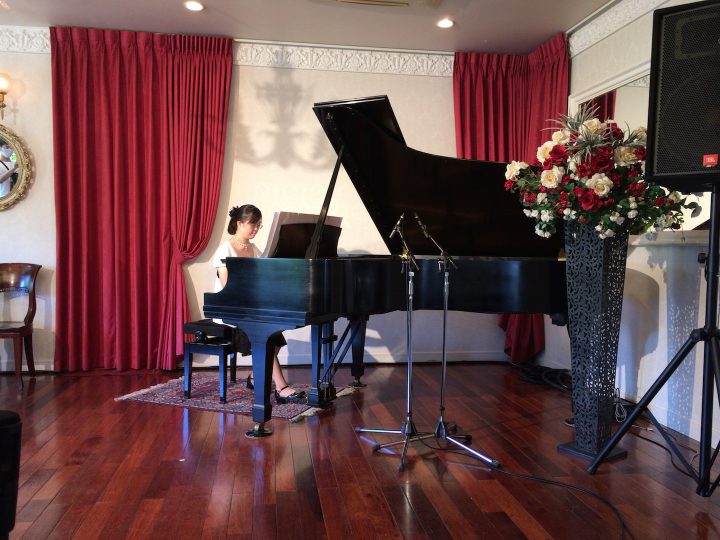
Mayu Shimizu will perform "Sunflowers," "Waltz No. 10 in B minor (Chopin)," and "Puppy Waltz."
"Wonderful Encounter Online Concert" program
Part 1: Piano performance by a person with Down syndrome, solo singing, and guest harp performance
Part 2: Messages from 11 members with intellectual disabilities to those who watched the online concert
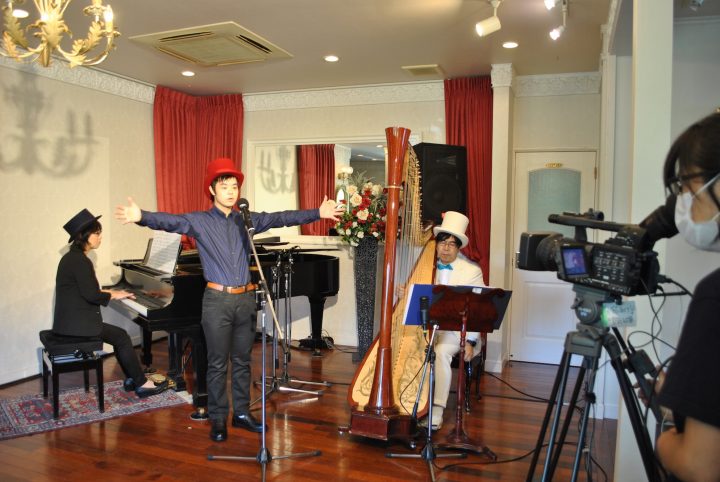
Shungo Utsumi (the author's eldest son) Solos "Stars on Earth" and "Subaru"
The venue was a French restaurant in Fujisawa City that also serves as a salon concert venue. Originally, the concert was planned to include tea and cake, but unfortunately, there was no audience.
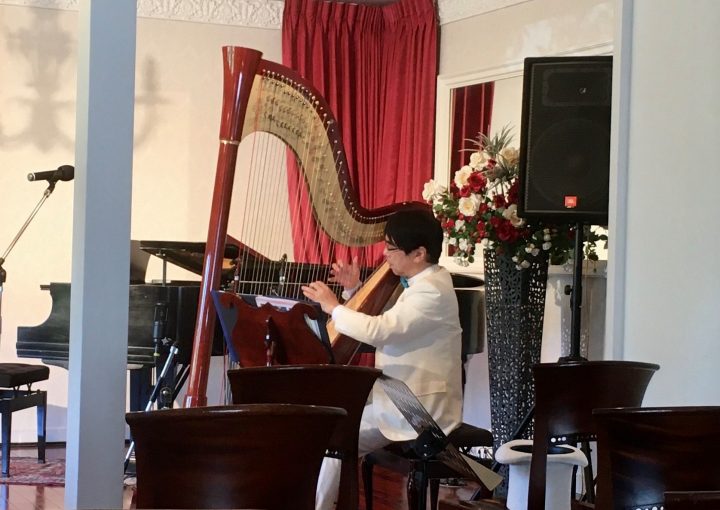
Harp performance by Kenichi Yagi, songs performed: "Londonderry Song," "Kojo no Tsuki," "Celtic Medley," and "Ebb Tide"
In the second half of the concert, the members of Dream Project shared their special skills and messages one by one. Members who were unable to attend the concert due to concerns about COVID-19 infection were asked to send in recordings of themselves dancing or reciting poetry at home, which they then edited.
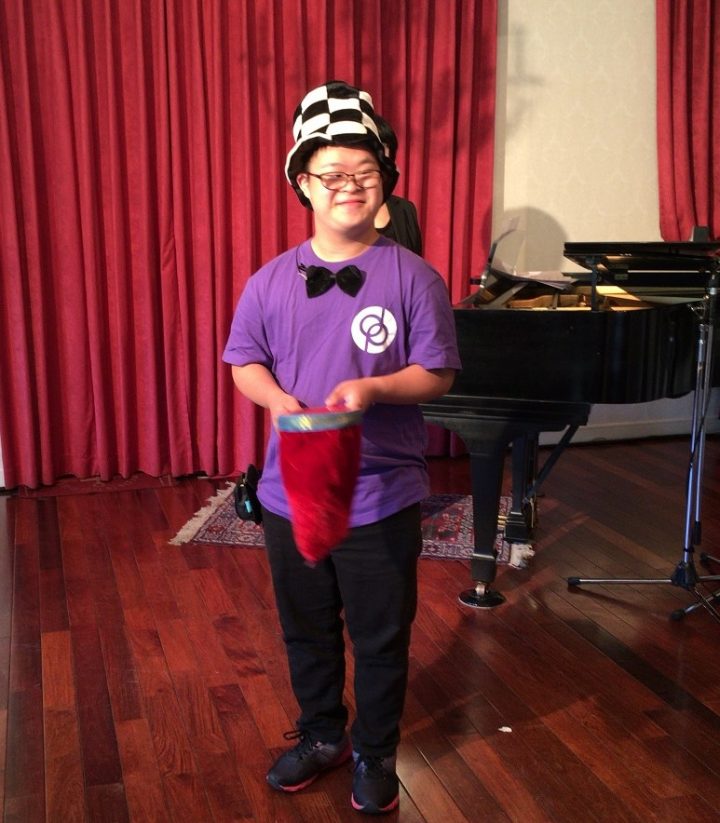
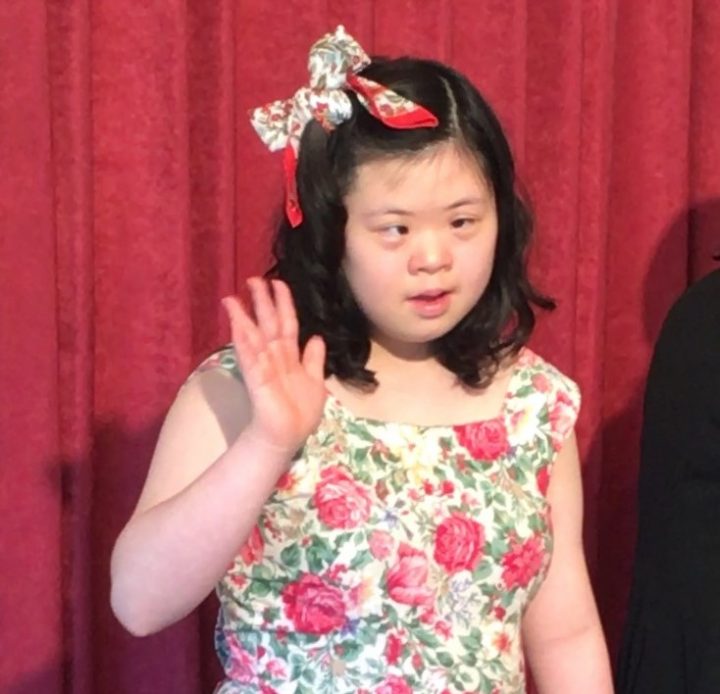
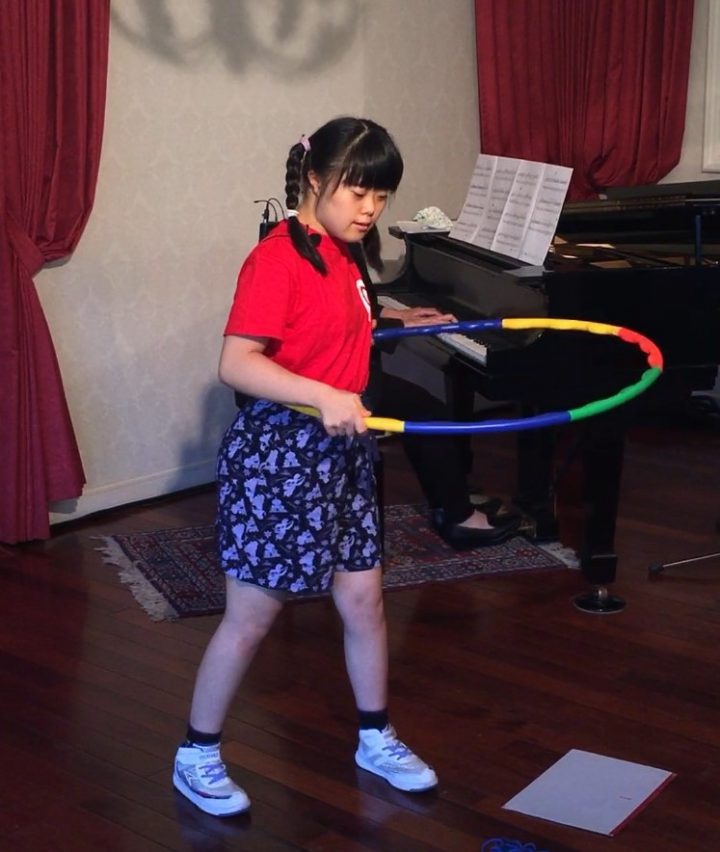
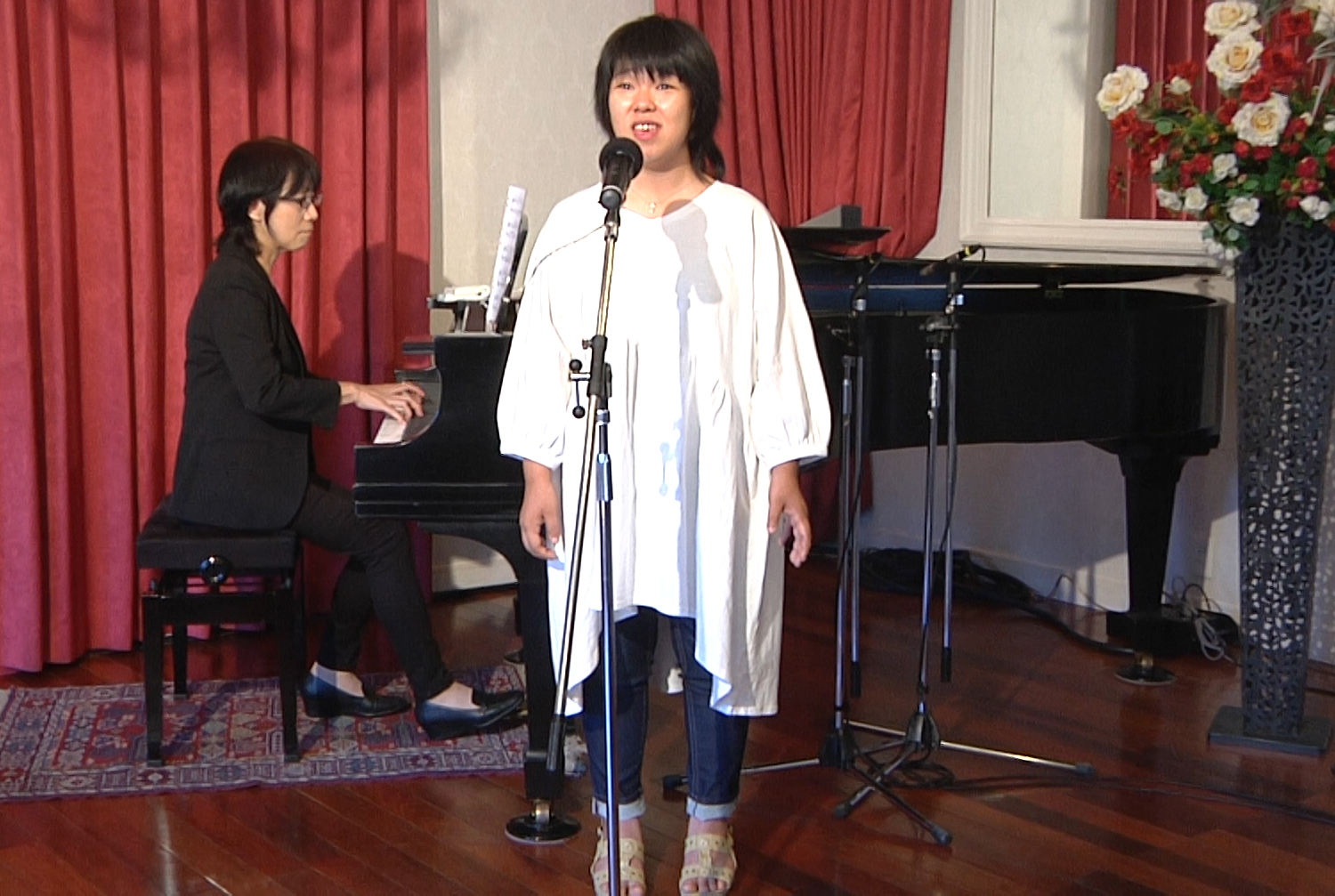
Comments from viewers (some excerpts)
●The dignified appearance of everyone during the presentations was impressive. I felt a clear desire to be seen and to communicate. And this desire led to them speaking clearly so that the other person could understand. I felt the importance of having the desire to communicate.
●It was fun to see each individual's individuality come to the fore. The harp was also wonderful. I think it's very important to express yourself and have a place to do so. It's difficult to hold events and recitals these days, but I respect the efforts of everyone who came up with creative ways to hold the event.
Currently, this concert can be viewed by visiting Doripro's website .
■Performing arts for people with intellectual disabilities
Performing arts, such as theater, music, and dance, are also called "performing arts." When it comes to performing arts for people with physical disabilities, many people were moved by the dancer with a prosthetic leg who appeared at the closing ceremony of the Rio Paralympics.
However, perhaps not much is known yet about performing arts for people with intellectual disabilities.
Art such as paintings and sculptures created by people with intellectual disabilities is known for its unique flavor and beauty.
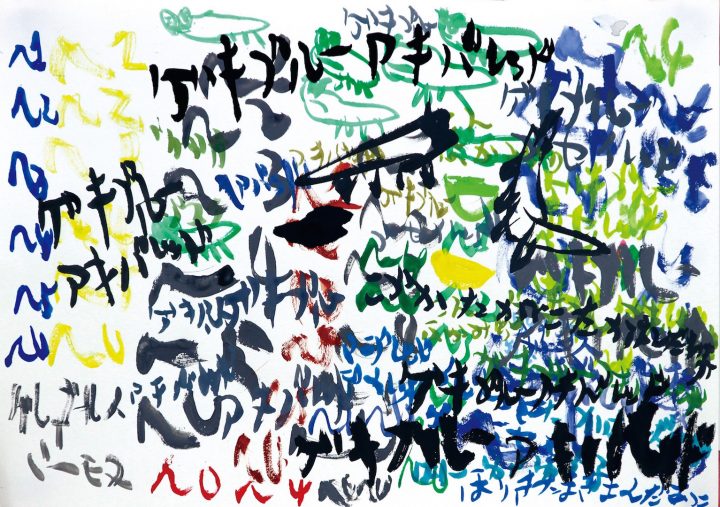
* A painting by Satoshi Nonomura, a member of Art de Vivre, based in Odawara, titled "Crocodile Lizard"
Many people are probably familiar with Kanazawa Shoko, a calligrapher with Down syndrome who wrote the opening title of the historical drama "Taira no Kiyomori."
In fact, there are several groups, including Dream Project, that bring together people with intellectual disabilities who are involved in theater, music, and dance.
There are some groups that are doing amazing things, getting featured in the media and winning awards overseas, and although it may be presumptuous of me to say this, I would like to say that I want more people to know about their unique performances.
It's a shame you don't know about it!
We would like to introduce some of our activities at Dream Project, as well as information on organizations with ties to Kanagawa that are involved in the performing arts, and information on overseas activities.
■Dream Project's plays and concerts
Since 2012, DreamPro has been holding "inclusion live" events at live music venues in Tokyo, featuring professional musicians and people with intellectual disabilities. In 2016, 2017, and 2019, they held a music and theater stage performance called "The 21st Wonderful Encounter," and in 2018, they held a music event called "Wonderful Encounter Concert" at Yotsuya Civic Hall.
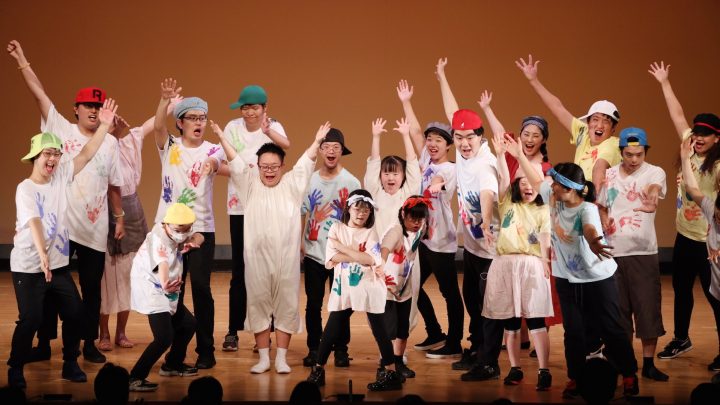
This photo shows a scene from the play "The 21st Wonderful Encounter," which was held at the Prefectural Kyosai Hall as part of Kanagawa Prefecture's "Coexistence and Co-creation Project" in August 2019. Most of the performers are young people with intellectual disabilities such as Down syndrome or autism.
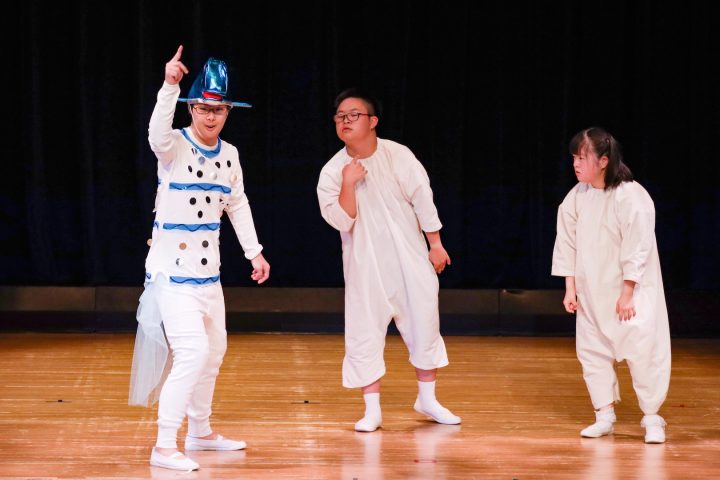
People with Down syndrome tend to have soft voices and slurred speech, making it difficult to understand what they are saying.
In 2015, when I first started writing a script because I wanted to do a play, I thought it might be difficult for them to actually speak their lines, so in the concept stage I envisioned a "narration play" in which they would communicate with gestures, hand movements, and facial expressions in sync with the narration. However, as they continued to practice, they became so eager to say their lines that they began to speak, ignoring the narration. One child who couldn't lift his head at first began to look straight ahead, and the lines of the other children whose mumbled lines I couldn't understand became easier to understand, and before I knew it, each child was energetically speaking and acting on stage.
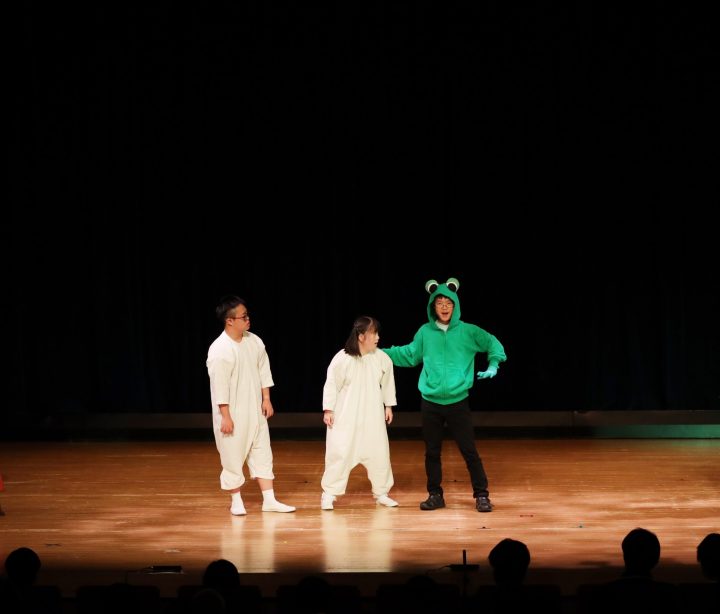
They are intellectually handicapped.
The degree of impairment varies from person to person, with some people experiencing a lack of comprehension, difficulty concentrating, or difficulty controlling their emotions.
A lot of things happen during practice and in the real world.
It is common for students to "freeze" during practice (a state of not reacting, not moving or speaking) and to become lost in their own world.
He barricaded himself in the bathroom and refused to come out, changed his lines to make them easier to say, and lost control of his emotions before rehearsal began and hid under a desk in the venue office.
On the morning of the performance, he gets separated from his mother and gets lost in the city, and then rushes to the bathroom during the performance, meaning he's late for his performance...
There are many things that go wrong, but above all, he has incredible power when it comes to the things he loves.
He is unconditionally honest about what is fun.
I love expressing myself and it's fun, so I can work hard.
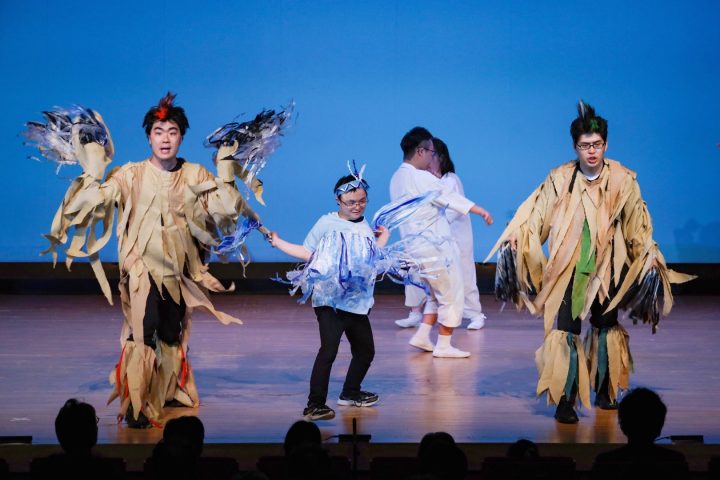
When we think of intellectual disabilities, we tend to imagine them as something that "there are many things they can't do" or "something that we don't understand," but sometimes their small comments, gestures, and actions can make us laugh, or even make us think, "They're amazing!"
There isn't much difference between them and us, and it makes me wonder, "What exactly is a disability?"
Actor Takako Tokiwa cares about these people and has volunteered to help out.
Many people always fill out the questionnaire at the end of the performance in great detail.
Excerpted from a survey conducted at the time of the 2019 performance.
I was really moved by how everyone was working hard at what they loved. I often stop myself from doing things because I worry too much about what others think, so I was impressed that they were enjoying performing from the bottom of their hearts.
●The play was filled with the happiness of being born. I believe that you have all experienced many hardships and difficulties up until now, and will continue to experience them in the future, but I hope that you will continue to have a kind heart that is considerate, compassionate, and loving towards others. I also gained many realizations from it.
The content makes you think about the meaning of being born. And it's wonderful to see the individual personalities of each of the performers as they act so well.
Regarding concerts, this will be the second online concert mentioned at the beginning, but the first, a "Wonderful Encounter Concert," held in 2018, featured a joint performance by performers with Down syndrome and performers with autism.
It was very interesting to see how the differences in their disabilities gave rise to unique musical styles.
The performers with Down's syndrome were kind and warm-hearted, and this was evident in their performances.However, each of them also brought with them the difficulties that come with the disabilities they each suffer.
Toshiki has a pacemaker in his heart, Hayato is deaf in his left ear, and Rintaro was born missing the tip of his right wrist, so he plays melodies using five fingers on his left hand and six fingers on his right wrist.
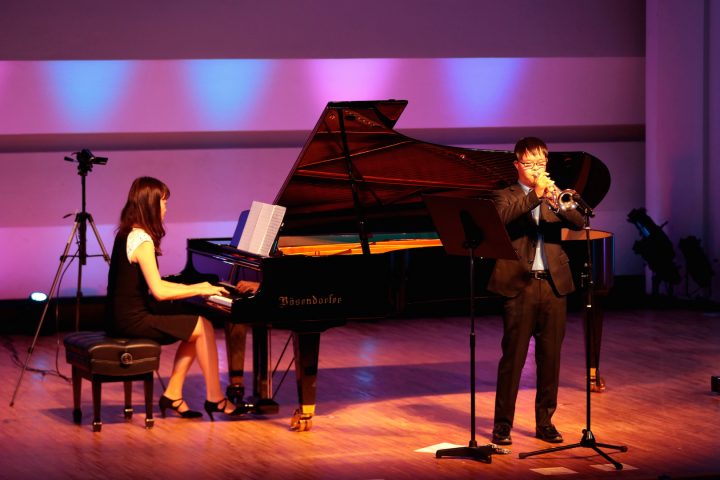
Trumpet performance by TOSHIKI
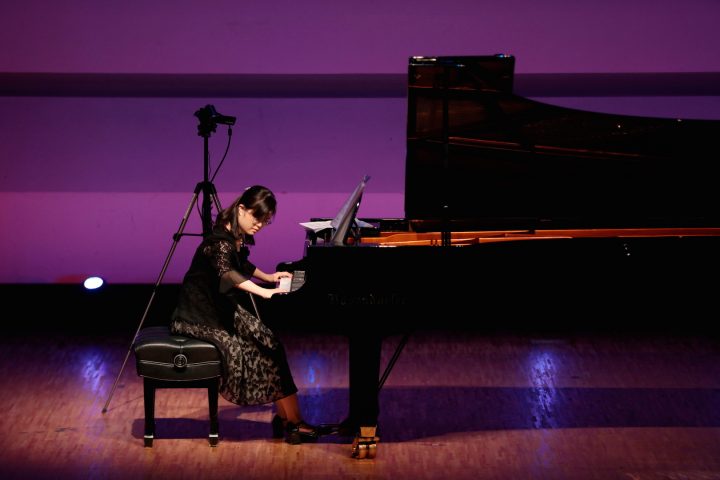
Piano performance by Mayu Shimizu
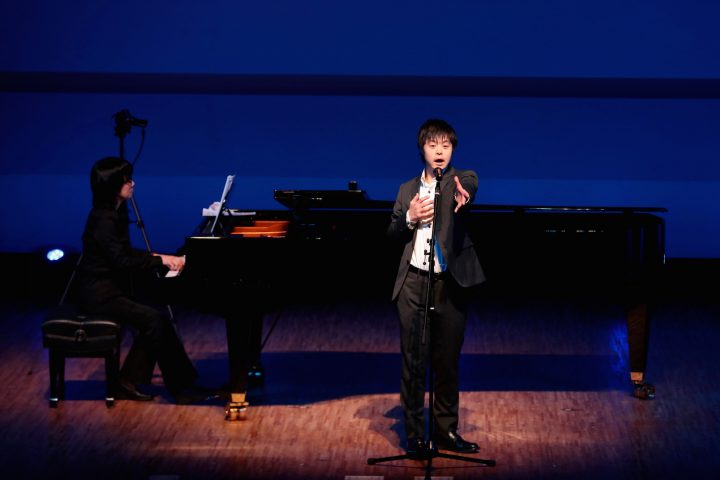
Soloist: Shungo Utsumi
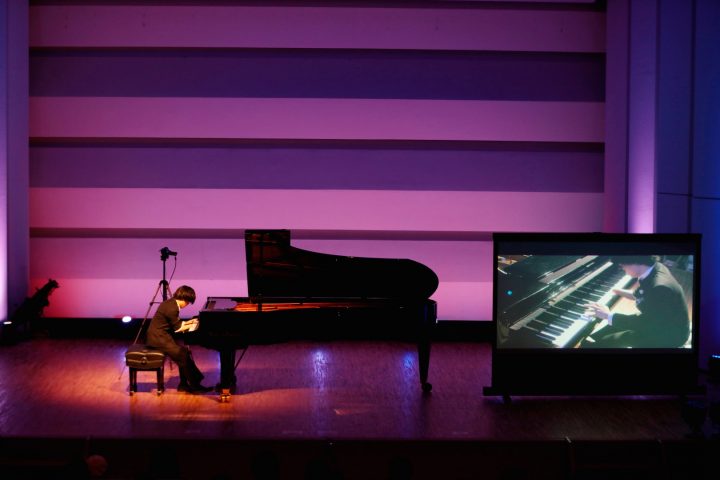
Piano performance by Rintaro Suzuki
On the other hand, the performers with autism were all hyperactive and restless as children, had strong fixations, and had difficulty learning the rules of everyday life.
However, thanks to her mother's realization that "she was only quiet when listening to music" and the creation of an environment where she could fully develop her talent, she was able to fully develop her talent. She has an exceptional ability to concentrate on the music she loves, and her playing and singing are filled with passion and dynamic energy.
Take the piano performances, for example. While the piano playing of Mayu and Rintaro, who have Down syndrome, is gentle and full of emotion, the piano playing of Takuto, who has autism, has a lively rhythm, as if his fingers are dancing joyfully across the keys, and it feels dynamic and like an orchestra that resonates deep in the heart.
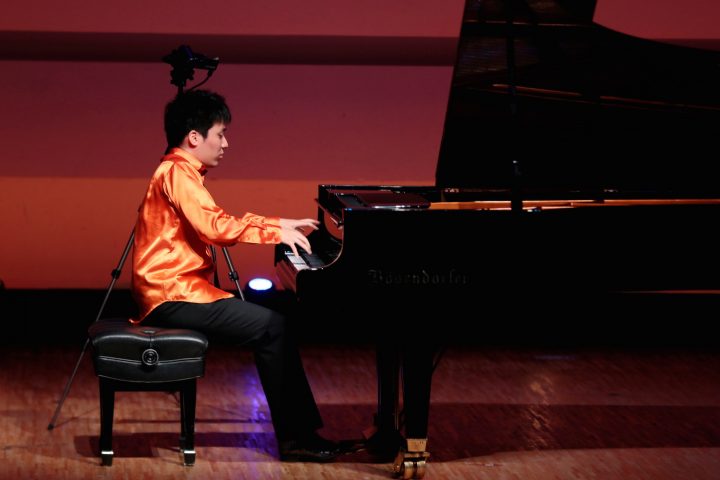
Piano performance by Takuto Koyanagi
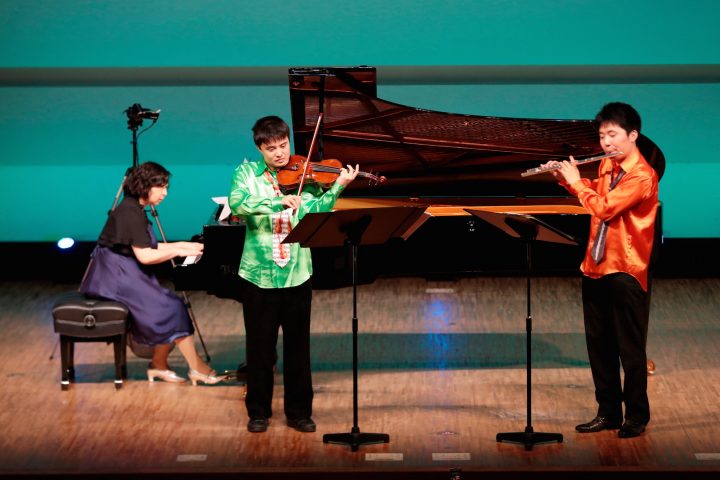
Violinist: Tadahiko Homma Flute: Takuto Koyanagi
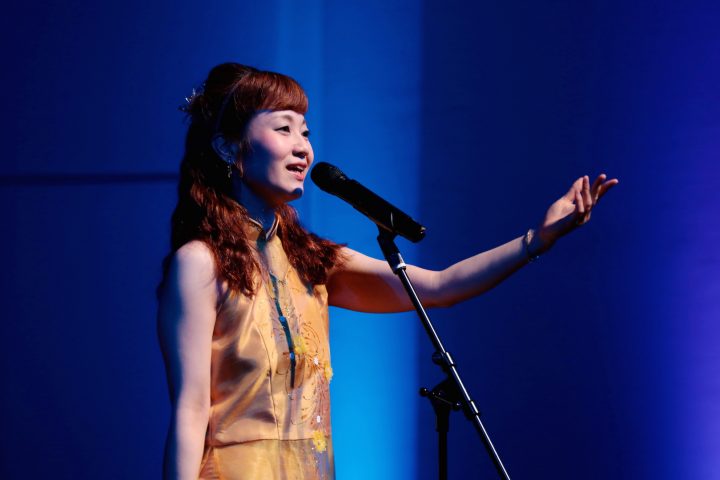
Soloist: Tae Kamiya
The concert received a great response.
There was loud, endless applause, people in tears, and many survey responses saying they were moved.
However, due to his intellectual handicap, his rhythm and tempo may not be as stable as other people's.
It's hard to call someone like Hayato "good," even as a compliment. He always hits the wrong notes.
So what did the audience applaud?
Someone told me, "Because there's no desire to make it look good, it resonates directly with people's hearts."
It's true that since it's difficult for everyone to express themselves in words, they put their true selves into their songs and vocals.
It may take an immeasurable amount of time to master a song, and they may not be good at achieving perfection, but their passion surpasses all of that.
He has the honesty to show his true self to the fullest, without any pretense or tactics.
There is an overflowing dedication.
I think that will move the hearts of those who listen.
Strength in weakness...
We tend to say "turn a minus into a plus," but the hard work and dedication that one has endured despite the various difficulties and the path one has walked without giving up shines through in performances such as musical instruments and singing. This can also be said of theater and dance.
I think that is one of the attractions of performing arts for people with intellectual disabilities.
Singer Mizukoshi Keiko, who came to watch the concert, wrote the following on her blog:
"There was piano, violin, trumpet, flute and solo singing. Each and every performance and song reached deep into my heart and I found myself tearing up at one point. (Omitted) Everyone made each song their own, and each and every one of them, as performers, poured it out to us with their bare hearts. (Omitted) I too felt many things as a mother, as a musician and as a person, and I also felt the important origins of everything. It was a truly precious time."
■Groups involved in performing arts related to Kanagawa
[Love Junks]
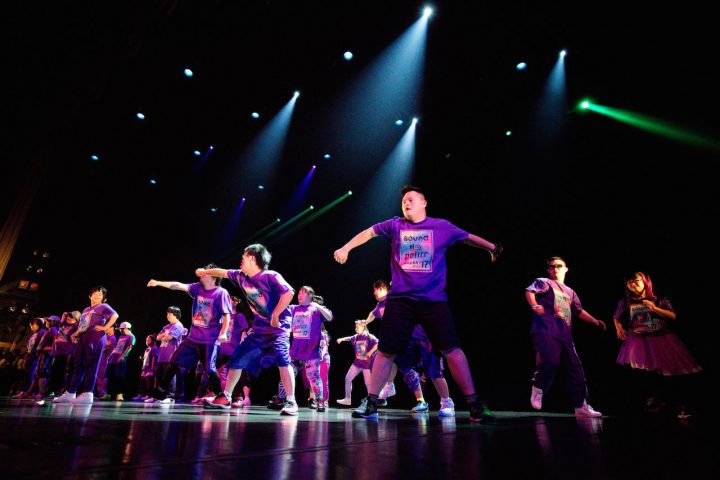 The presentations are always full of enthusiasm
The presentations are always full of enthusiasmLove Junks is an entertainment school for people with Down Syndrome.
There are schools in Kanto, Kansai, and Hokkaido, with a total of 800 members.
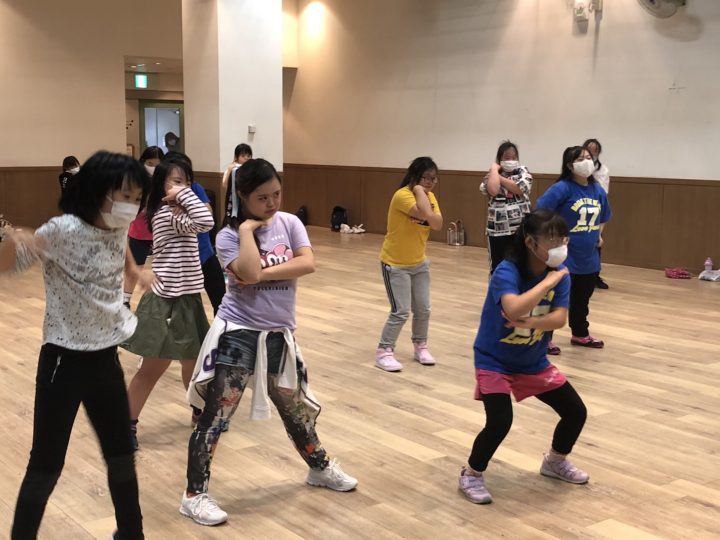
Love Junks Kanagawa School students taking lessons at Yokohama Rapport
"I feel that people with Down Syndrome are excellent at expressing their feelings directly," says Anna Makino, the group's founder. In 2002, she was asked by the Japan Down Syndrome Association to teach dance to children with Down Syndrome. She was captivated by their ability to attract people and their high level of sensitivity, and so she founded Love Jansuku.
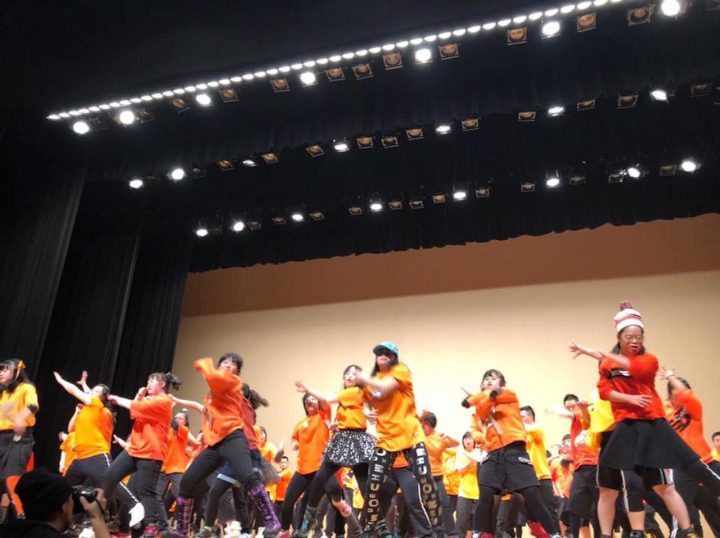
Twenty-six years ago, when my child was born, it was rare to see people with Down syndrome on television. Love Junks' activities, which include numerous appearances on television and at events around the country, have not only encouraged parents raising children with Down syndrome, but have also become a major presence in informing people who are unfamiliar with Down syndrome about its vibrant, hidden power. Anna, who trains and choreographs for professional dancers, has powerful words when she talks about the appeal of dancing by children with Down syndrome.
"The sight of them enjoying dancing to the fullest touches people's hearts and reminds them of their roots."
[Hot Generation]
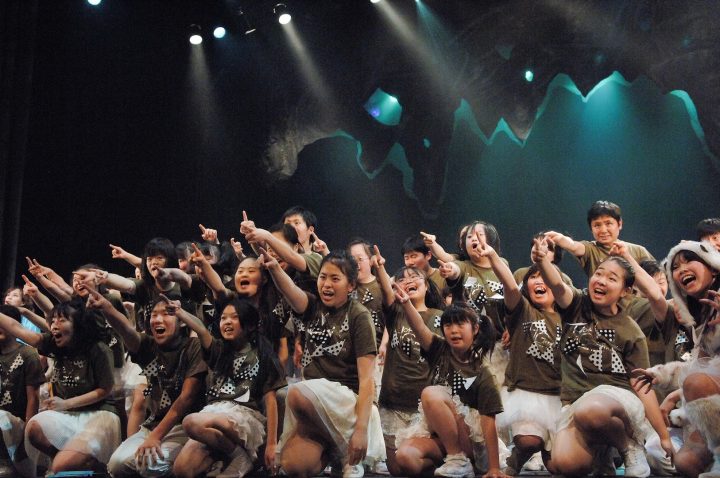
Hot Generation performs original musical productions three times a year with professional musical actors, regardless of whether they have a disability or not.
The group's leader, Meiko Torii, says of the members who have intellectual disabilities, "Their performances, brimming with kindness and beauty, are woven by their pure and innocent souls and give us the greatest healing and courage."
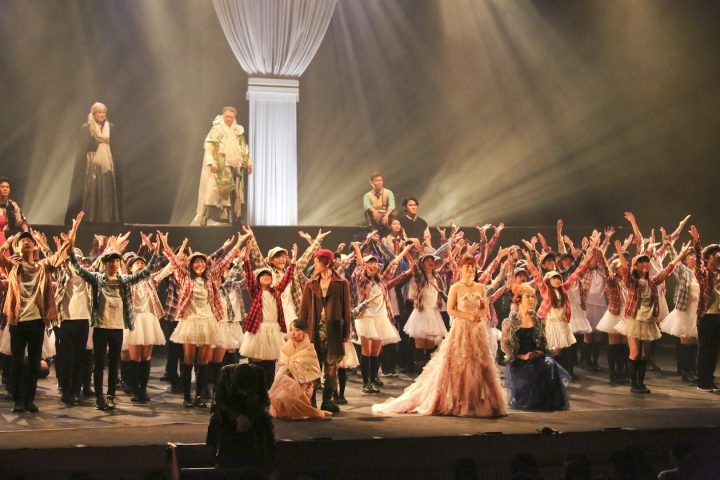
Tae Kamiya (seen in the front row on stage), who has autism and plays leading roles in many of the productions, has a singing voice that sounds as if it has descended from heaven.
Torii, who has been coaching Tae since she was in high school, says:
"There are times when I am not able to approach training with a stable emotional state, but it is important to always believe in the potential of my opponent."
It is precisely because of the invisible struggles that Tae faces that she shines on stage with a dignified presence that makes her disability seem insignificant.
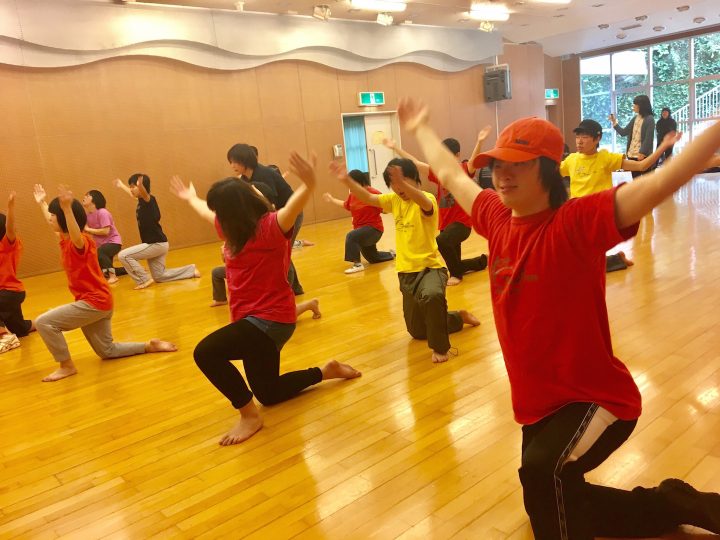
Hot Generation Kanagawa School members practicing at Shonandai Cultural Center
I had a connection with Hot Generation, and about 20 years ago I asked Torii to open a branch in Kanagawa, and so we established the Kanagawa branch. Together with our fellow families of children with disabilities, we worked to create a place where children could smile.
I graduated seven years ago to found Dream Project, but I believe that inclusion activities, regardless of whether or not someone has a disability, are of great significance.
[Salsa Packing Tape]
Salsa Gum Tape is a rock band formed by musician Tetsu Kashiwa and made up of people with intellectual disabilities.
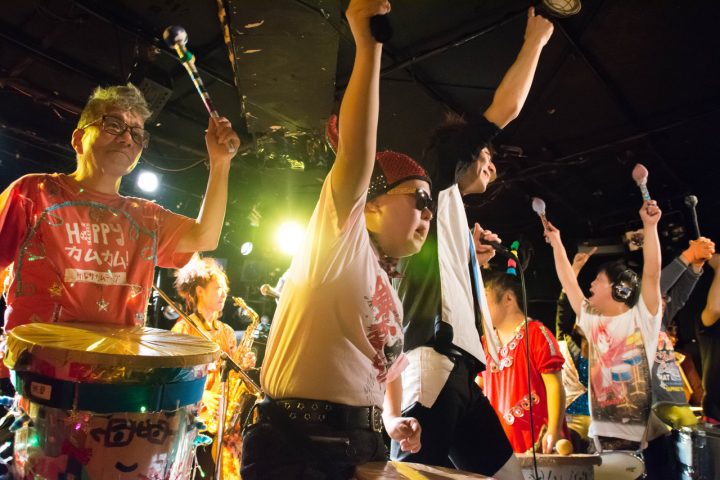
It has been 26 years since we started working at welfare facilities in the prefecture.
The energy with which people with intellectual disabilities sing, play, and get excited as entertainers is incredible.
In the "Wonderful World" that Kashiwa created in response to the Tsukui Yamayuri En incident, anger and hope are swirling and exploding.
In January of this year, Salsa Gum Tape invited members of Dream Project to join them in singing this song. The stage and the audience became one, and they all sang together in a huge chorus.
"I was born to be happy! I love being alive!"
The sight of the members with intellectual disabilities shouting from the bottom of their hearts must have been etched in the hearts of everyone in the audience.
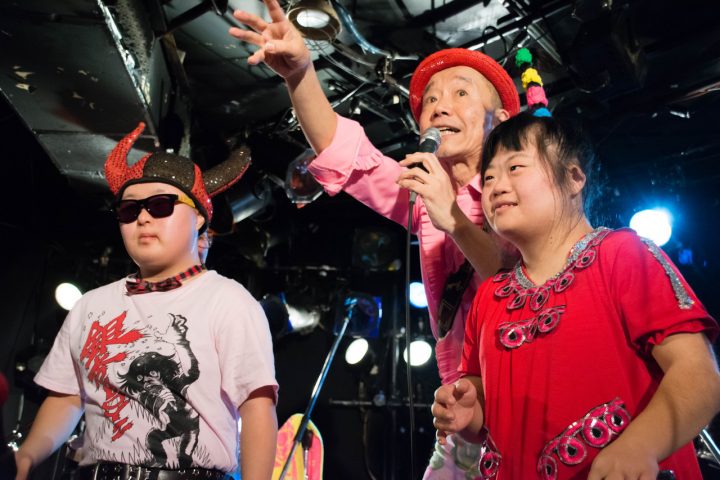
Kashiwa Akira (behind) is over 70 years old, but his creative energy shows no signs of slowing down.
Due to the COVID-19 pandemic, all live performances have been cancelled. However, they performed live for the first time in a while at an online event without an audience held in November.
Kashiwa also wrote a new song, "I Want to See You!", hoping to connect the hearts of people who are unable to meet due to the coronavirus pandemic.
"We rock and roll every day because it's simply fun. If that fun spreads to someone else and we can share it, it becomes even more fun. It's the most peaceful sharing in the world!!"
Or rather, as Shiwa-san's message suggests, the rock 'n' roll spirit of surviving in any situation is alive and well.
All of these venues put on powerful performances that break down the sense of stagnation in society, but of course there are many other venues that are also active with conviction.
■ Overseas information
Finally, a little bit of information from overseas.
Although it is a little different from the performing arts field, overseas, many people with Down syndrome have been active in television and film for over 20 years.
In 1996, Pascal Duquesne, an actor with Down syndrome, was cast as one of the co-stars in the film "The Eighth Day," and achieved the remarkable feat of winning the Best Actor Award at the Cannes Film Festival.
This film was released in Japan in 1997, and it gave me the courage to raise my own child with Down syndrome.
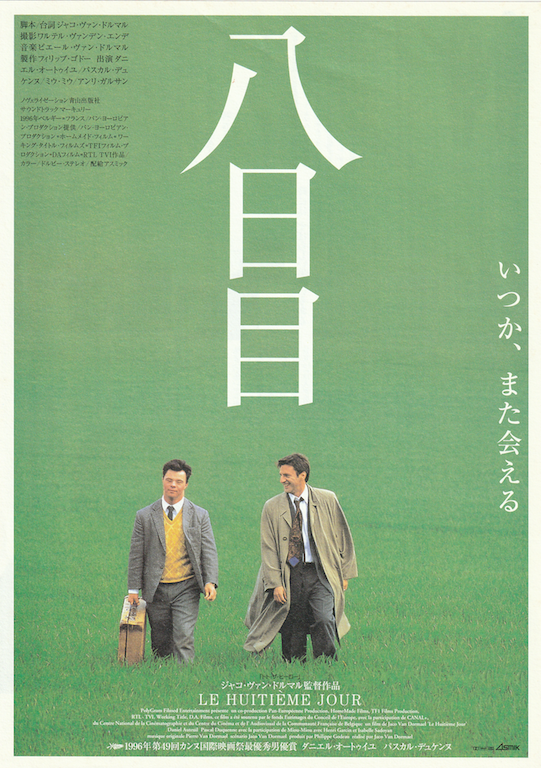
Lauren Potter, who has Down Syndrome, plays Becky in the hit US TV drama "Glee." Some of you may already know it, as it aired on NHK Educational TV in 2012. It's a coming-of-age drama set in a rural high school, featuring singing and dancing, about a group of underachieving high school students. Becky appears as a member of the cheerleading squad. Her classmates and teachers accept her as a normal person, despite her having Down Syndrome. I was as amazed and intrigued by the American culture, where students are treated as peers and fellow students, without any special treatment, as I was impressed by her acting, which rivals that of other actors.
*Reference: Trailer for the TV drama "Glee"
And now, the film "Chocolate Donut" is garnering attention. Released in 2014, this tear-jerking film tells the story of Rudy and Paul, who fight against social prejudice while trying to live their own lives. Isaac Leyva, who plays Marco in this film, is also an actor with Down syndrome.
*Reference: Trailer for the movie "Chocolate Donut"
In December 2020, a play called "Chocolate Donut" directed by Miyamoto Amon and starring Higashiyama Noriyuki will be performed in Japan. A real-life boy with Down syndrome plays the role of Marco.
The fact that many people with intellectual disabilities appear on television and in films overseas is likely due in large part to the existence of acting training schools and production companies. In Los Angeles, there is an entertainment production company for people with intellectual disabilities, and I have had the opportunity to visit it. Many people with intellectual disabilities have appeared on television and in films through it. In the 300th episode of "ER," a popular medical drama in Japan, an actor with Down's syndrome appeared in the important role of Peter Fonda's son.
Furthermore, women with Down syndrome are active as models overseas.
In June 2020, Gucci, a luxury brand that leads the global fashion industry, appointed British model Ellie Goldstein as the model for its advertisement in the Italian edition of Vogue.
In October, the global skincare brand Obagi announced that Grace Strobel would be a model.
In recent years, many women with Down syndrome have appeared on major stages as models. This shows that the world is moving towards "beauty that values diversity and is unique to each individual."
In Japan, former Paris Fashion Week model Mariko Takagi is working to train models with intellectual disabilities. The day when a model with Down's syndrome from Japan will make an impact on the world may not be far off.
■Finally
After seeing the film "The Eighth Day," she became interested in Down syndrome and theater, and for over 20 years she has believed in the potential of people with intellectual disabilities in acting, singing, and dancing, and has been working on this.
It may be presumptuous of me to write this article, as there are many other people out there who are doing wonderful things, but I continued writing in the hope that I could get as many people as possible interested in their performances.
With the Olympic and Paralympic Games coming up next year, and as a legacy, I hope that performing arts for people with disabilities, not just intellectual disabilities, will take root in Japan.
"I want to see their performance."
"Because it's fun to have unique personalities"
"Because it's fun."
I sincerely hope that, motivated by such factors, more and more ordinary people will want to attend plays, concerts, and dance shows performed by people with intellectual disabilities, and that we will be able to create a society in which these venues are sold out.

